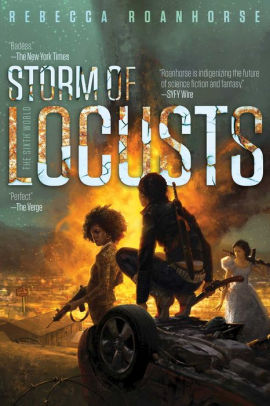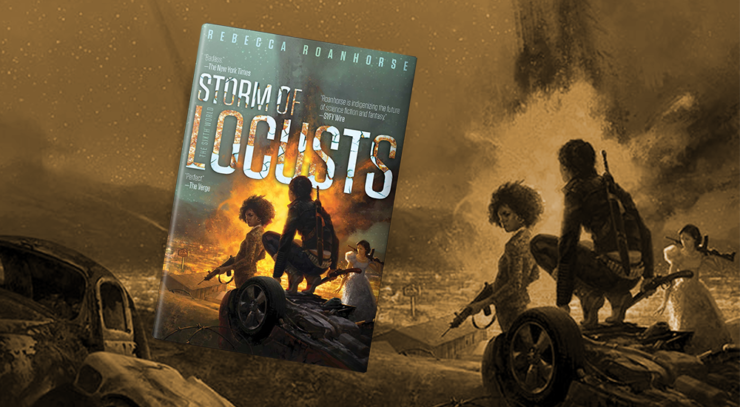Rebecca Roanhorse burst onto the SFF writing scene in the last couple of years. Her “Welcome to Your Authentic Indian Experience” (Apex, 2017) took home the Nebula and Hugo Awards for Best Short Story, and she has also won the John W. Campbell Award for Best New Writer. Her debut novel, Trail of Lightning, came out last year to wide acclaim. It has the distinction of being a post-apocalyptic novel by a Native American author about Native American (Navajo, or Diné) characters. The same is true for the sequel, Storm of Locusts, which strikes me as a stronger, leaner novel.
Where Trail of Lightning reminded me, tonally, of a late nineties/early 2000s urban fantasy novel (before that genre became very much intertwined with the structures and tone of romance), wearing its hard-bitten noirish thriller influences plainly on its sleeve, its pacing and structure were less accomplished than its voice and setting. This meant the impact of its climax and conclusion wasn’t pitched to the kind of peak that it could have achieved.
Storm of Locusts is similar in tone (part of its opening reminded me of nothing so much as one of the very early Laurel K. Hamilton Anita Blake novels, with a protagonist itemising their weapons and struggling with the nature of monstrousness) to its predecessor, but in its structure and its building tension, it’s a stronger, more accomplished book.
When Storm of Locusts opens, four weeks have passed since Maggie Hoskie, Diné monster hunter, survived her showdown with her semi-divine mentor at Black Mesa. Her best friend (perhaps her only friend) Kai Arviso hasn’t spoken to her or visited since, and she’s trying to put herself back together. Well, sort of trying. Then her latest bounty hunt goes wrong and the death of one of her allies—a man who could have become her friend—leaves her standing as guardian to a young woman, Ben, whose clan powers involve tracking.
Immediately on foot of this, before Maggie has had a chance to wash the blood off her clothes, two of her sometime-allies, the Goodacre twins (Clive and Rissa), show up with the news that Kai and the youngest Goodacre, Caleb, have disappeared. They want Maggie to track them down and bring at least Caleb back. But Maggie (accompanied now by Ben, who wants revenge) figures out that a man who calls himself the White Locust and is the leader of an apocalyptic cult known as the Swarm is responsible for Kai and Caleb’s disappearance. Maggie wants to find Kai and make things right between them. That drives her—along with Ben and Rissa—out past the walls of Dinétah into the ruined, apocalyptic landscape of the rest of the post-flooded world. Though the gods and powers of the Diné also move in this world, the most frightening and destructive monsters here are human ones.
Buy the Book


Storm of Locusts
Storm of Locusts is part violent road-trip, part quest-narrative—the kind of quest with mythological resonances, in which being reasonably polite to divine and semi-divine beings (or random cranky elders) can result in acquiring important new information, or it can result in being yanked around. And where getting trapped on a deserted road can mean being captured by slavers and organ dealers, and needing to make twisty escapes. (Ben rescues herself, and then apologises to Rissa and Maggie for spoiling their attempt to rescue her, in one of the novel’s funniest moments.)
When Maggie and her team finally catch up with Kai, his behaviour stretches the bounds of Maggie’s ability to trust. The White Locust’s plans are well advanced, and include creating a cataclysmic flood that will destroy most of Dinétah—for which Kai’s help is vital. In order to stop him, Maggie has to chose where to place her trust, and how to reconcile her view of herself and of Kai with her view of their actions.
Roanhorse writes solid characters. Maggie’s voice is distinctive, and Ben—confident, teenage, declaring herself a bisexual who prefers women, with trauma almost to match Maggie’s—steals every scene she’s in. Maggie’s interplay with Clive and Rissa makes for interesting reading, and while I’m not as invested in her friendship with Kai as the narrative perhaps intends, their complex dance of trust works very well. Roanhorse pulls off a tense, distinctive, climax and conclusion, one that provides a satisfying emotional payoff for the novel’s characters. Where Trail of Lightning promised, Storm of Locusts fulfils.
And it closes with a hook for more trouble to come.
I enjoyed Storm of Locusts, and I’ll be looking forward to finding out what happens next.
Storm of Locusts is available from Saga Press.
Liz Bourke is a cranky queer person who reads books. She holds a Ph.D in Classics from Trinity College, Dublin. Her first book, Sleeping With Monsters, a collection of reviews and criticism, was published in 2017 by Aqueduct Press. It was a finalist for the 2018 Locus Awards and was nominated for a 2018 Hugo Award in Best Related Work. Find her at her blog, where she’s been known to talk about even more books thanks to her Patreon supporters. Or find her at her Twitter. She supports the work of the Irish Refugee Council, the Transgender Equality Network Ireland, and the Abortion Rights Campaign.










